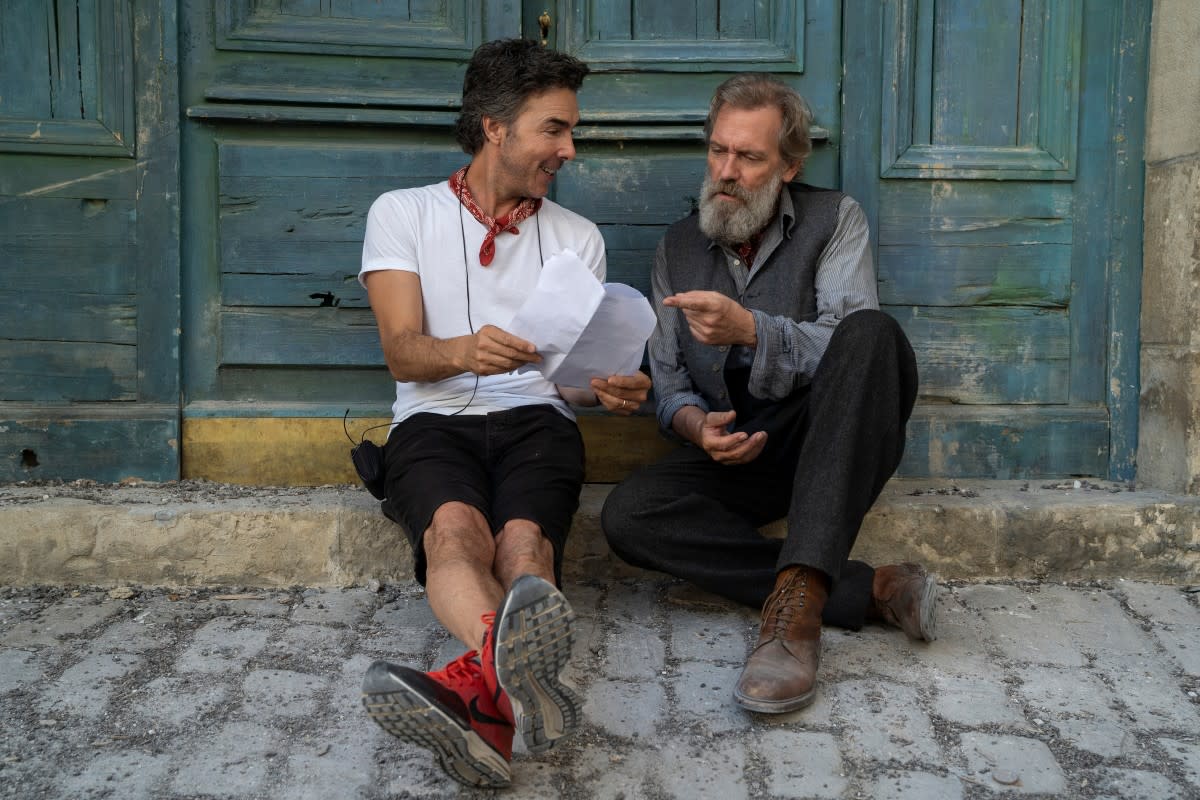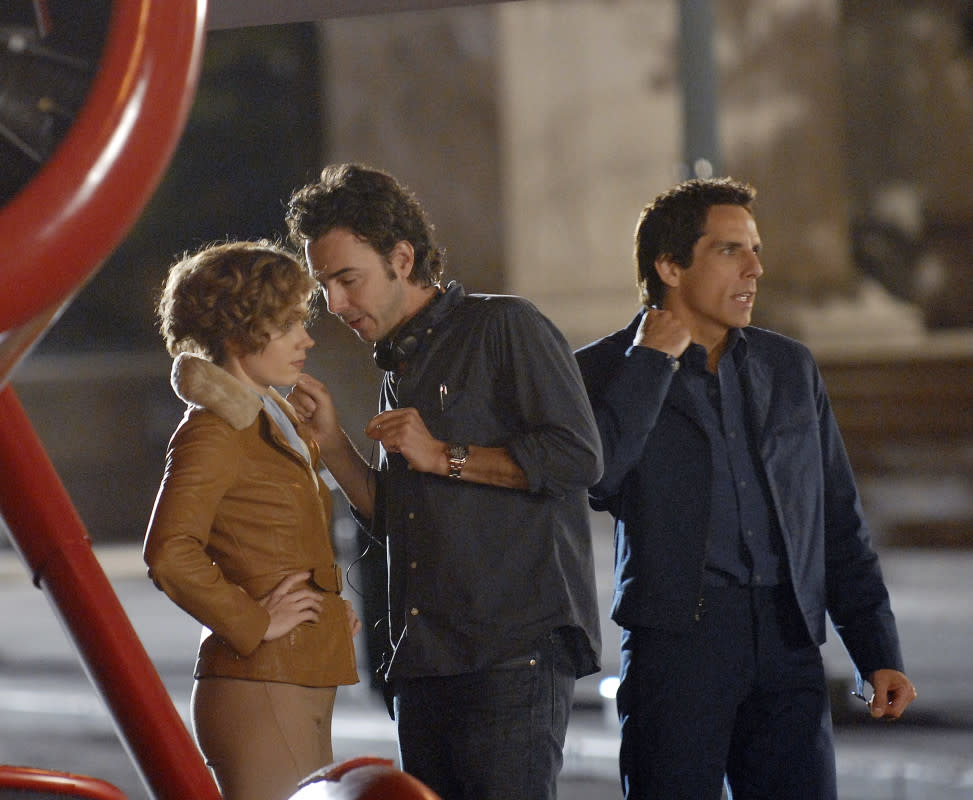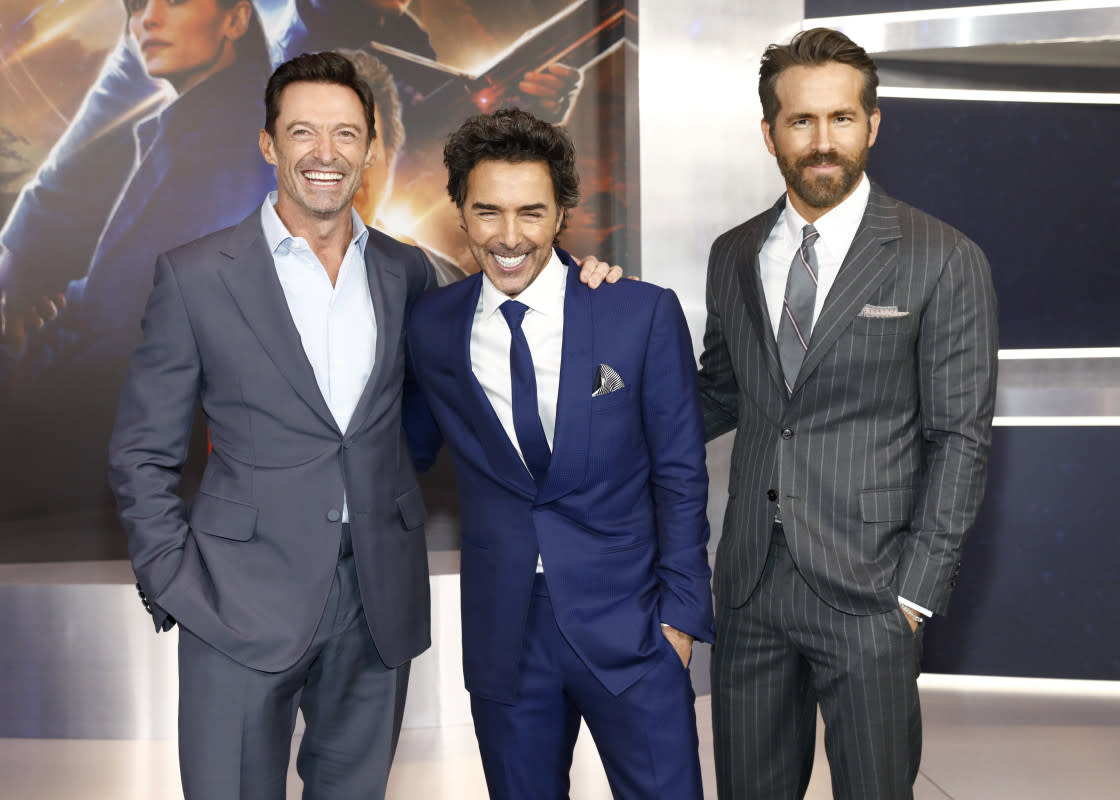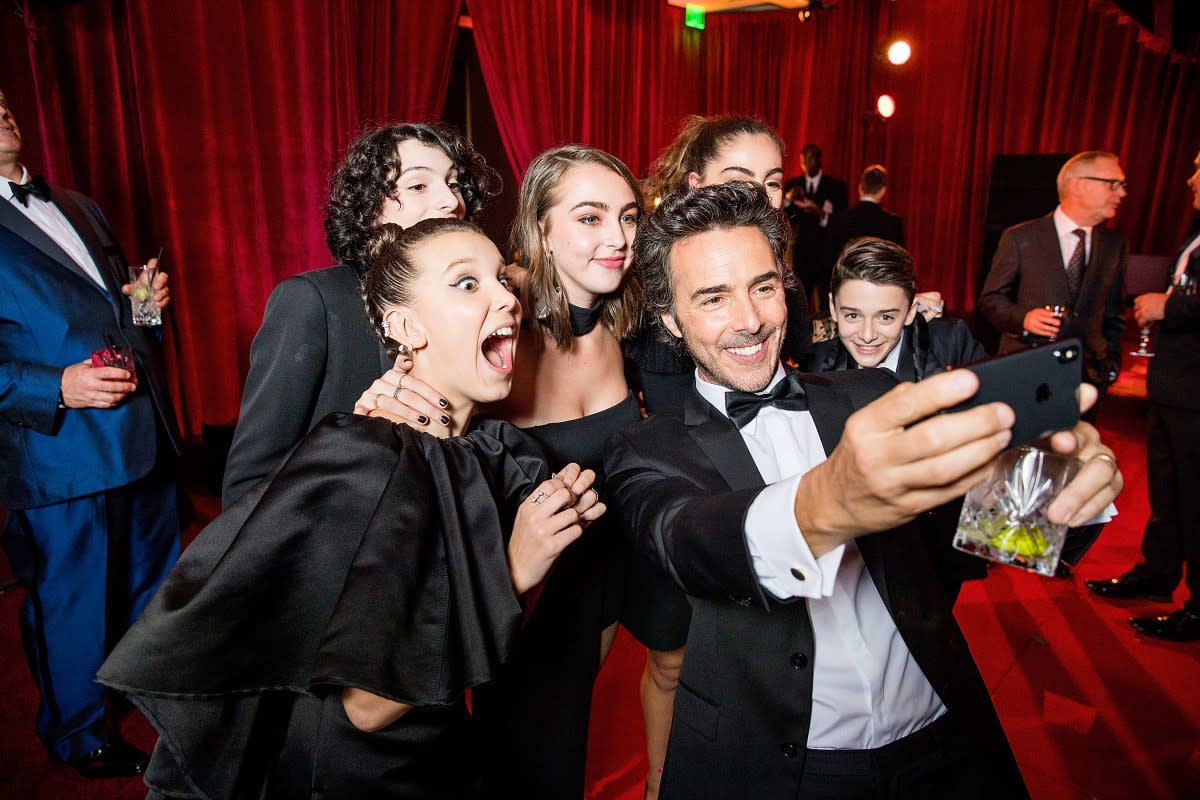Shawn Levy Looks Back at His 'Fated' Career

Shawn Levy
It's hard to find a person in Hollywood with a track record quite as impressive as Shawn Levy's. The Canadian director, producer and occasional actor (you may have spotted him in Taylor Swift's "All Too Well" music video) has an IMDb page that could make many an Oscar winner jealous. After getting his start directing Disney and Nickelodeon episodes, Levy catapulted his career in family-friendly fare with the 2000s classic (and one of my favorite movies of all time) Big Fat Liar. That parlayed into hit franchises like Cheaper by the Dozen, The Pink Panther and Night at the Museum.
In the 2010s Levy began producing more projects through his production company, 21 Laps, which brought us The Spectacular Now, Love and Monsters and Arrival (for which Levy snagged a Best Picture nomination). He also paired up with Ryan Reynolds for Free Guy, The Adam Project and the upcoming Deadpool 3.
Perhaps Levy's biggest success to date, however, is Stranger Things. Levy and 21 Laps partnered with The Duffer Brothers to develop the project before Netflix was involved and helped launch what has arguably become the streamer's crown jewel. To quote my beloved Big Fat Liar, Levy's projects are "quality, substance, art."

Netflix
After years of working in the the more family-friendly comedy/sci-fi space, Levy is finally trying his hand at a drama, and he is certainly swinging for the fences. His four-part miniseries adaptation of the Pulitzer-Prize-winning World War II epic All the Light We Cannot See arrives on Netflix on Nov. 2. In addition to producing, Levy directed all four episodes of the period drama starring Aria Mia Loberti and Louis Mofmann along with Mark Ruffalo and Hugh Laurie. It's a sumptuous feast for the eyes and unlike anything Levy has taken on previously.
In the lead up to All the Light We Cannot See's release, Parade's resident Big Fat Liar scholar sat down with Levy to discuss the filmmaker's career successes, his latest projects and of course what it was like to paint Paul Giamatti blue. Here's the conversation:
Thank you so much for taking the time to do this. I think I said this in an email. I don't know if it got to you, but...
Oh it did. You're the Big Fat Liar fan. How could I resist, Matt?
I didn't see it in theaters, but we had the DVD copy that our neighbors let us borrow, and I held on to it and never gave it back. I've probably watched Big Fat Liar like 200 times.
Oh my god. Well, I'm gonna let you in on a little secret. A first movie by a director is the quickest way to a director's heart. So this is adorable, and I love it.
It's such a good movie. I quote it all the time to everybody.
Give me your go-to, just to give me a little smile.
At every press screening or event I go to, I say, "It's just like you wanted Wolf, the press is all here."
Let me tell you the ones we use in my family all the time. First of all, we use "Sayonara, sucker." This one I use a lot. I'll be like, "What a day." When Marty Wolf is in the kitchen after the earpiece has been glued into his head.
So I have four daughters, and making family films early in my career was such a joy because I got to share my work with them. So Big Far Liar was the beginning of that. "BFL, Biffle," as it's come to be known.
So with your work in TV, and then Big Fat Liar, you started in a very family-friendly entertainment space. Was that something you planned or just sort of fell into?
It was accidental, but I've since come to believe it was fated, because the idea we have of ourselves doesn't always line up with who we actually are and what we're actually for. So to be more specific, when I was an undergrad at Yale and a film student at USC, I was all about drama. I loved drama films. I had written a thesis movie that was a straight-up drama, and right as I was starting to prep it, a classmate of mine said I have this idea. "What about two kids in a coming-of-age story in a small town where nothing exciting ever happens get married to get into the Guinness Book of World Records?" And I knew as soon as I heard that premise that the title would be "Broken Record."
I knew that it would be funny and charming and warm-hearted. And I abandoned my drama, and I made Broken Record, and it launched my career. It put me down this road of lighter, more populist and warm-hearted fair. That wasn't what I set out to do, but [it's] what I realized I intuitively knew how to do.
So for Big Fat Liar, was there anything on that shoot that went wrong or lessons that you learned?
Oh, yeah, the big lesson on Big Fat Liar was if you have a character who needs to be blue, don't spray paint the actor. It is endlessly time-consuming and deeply uncomfortable. Back in 2000, when Marty Wolf gets turned blue, the only way we knew how to do it was to airbrush spray him with blue paint. There is a line in Big Fat Liar where Marty Wolf says he spent the night with a scrub brush and a can of turpentine. That was basically Paul Giamatti's life. It was not pleasant for him, but my gosh what a trooper he was, and because we were buddies from college, we had a ball in spite of the the blue paint.
You've worked with comedy legends like Steve Martin (in Cheaper by the Dozen and The Pink Panther) and Robin Williams (in the Night at the Museum series), how was directing them?
It was certainly intimidating and a little bit scary at the beginning because I revered them, but I quickly realized they were devoted and personable professionals who wanted to be directed. They needed me to do my job well and not be daunted by the depth of respect I had for them, and they became real partnerships.
Interestingly, in the case of Steve Martin, Robin Williams and Ben Stiller, this led to repeated movies together. These are three legendary talents who became friends and from whom I learned a huge amount.
Do you have one lesson in particular that stands out?
What I learned from Steve Martin, who is also of course a writer, is that it's not enough for the idea to be funny. The idea needs to be funny in a way that matches the comedic style of the performer. You need an alignment between idea and performer. So the kind of thing that Steve Martin can spin into comedy gold is very different than Ben Stiller or Ryan Reynolds. Every comedic star has a specific sweet spot of tone of their comedy, and as a director and producer, you need to make sure you're looking for that intersection.

Bobby Bank/Getty Images
Are there any performers you would love to work with but haven't had the opportunity to?
Yes. Tom Cruise. Ryan Gosling. Margot Robbie. There are others.
You also produce a number of projects with your company 21 Laps. How do you determine which projects you'll direct versus which you'll produce?
So 21 Laps is a production company I founded after Night at the Museum, and I did it because back then, I didn't know if I'd ever get the chance to direct things outside of family comedy, but I knew that I wanted a creative life that was more eclectic and had a broader range. And that led to small, early movies like The Spectacular Now and bigger movies later like Arrival.
For me, the decisive factor between producing and directing is "Can I resist it?" Producing a movie is taxing, but it doesn't consume your whole life and heart in the same way that directing does, so if I'm gonna say "yes" to directing, it needs to be a something I cannot resist.
It also needs to be something that I know how to bring to life in a way that suits the material best. When I developed Arrival, I knew that style of film didn't play to my sweet spot and that's why Denis Villeneuve was the perfect filmmaker. With other projects, like Free Guy or The Adam Project, I understood the DNA of those stories in a way that was singular and unique to me.
Related: Read What Levy Had to Say About an Adam Project Sequel
Arrival was a massive success and earned you a Best Picture nomination at the Oscars. Did you ever expect that or was it a total surprise?
No, you have to understand. In the aftermath of my third Night at the Museum movie and Robin Williams' death, I took a decisive pause. I decided I wasn't gonna direct a movie every year the way I had been. And I was going to invest more time and energy into 21 Laps. It was in those years around 2014 that we found Stranger Things. We found Arrival. But we had no idea that either of those projects would succeed. I feel like time and again, life has taught me when you do things for mercenary reasons, they often don't work out, and you're left feeling hollow. But when you do things for the right reasons, which is passion and belief in something being special without calculation of outcome, those have been the experiences that have defined and changed my life.

Monica Schipper/Getty Images
You've worked with Ryan Reynolds a lot lately. How did that partnership come about?
Amazingly, it all started with Hugh Jackman, my personal prophet. When I was making Real Steal back in 2010, I vividly remember Hugh saying, "If you ever meet Ryan, he's going to become your best friend. And if you ever work with Ryan, you two are never going to stop." That was in 2010. Ryan and I met once or twice to talk, but we never quite found the right piece of material.
Then in July of 2018, on July 17th, my daughter's birthday, I got a text out of the blue from Ryan, who I'd not heard from in at least a year, saying, "What are you doing next spring? I think I found our movie." And that script was Free Guy. It kicked off this brotherhood and creative partnership that continues to grow and enrich our lives so much.
Related: Read What Levy Had to Say about a Free Guy Sequel
You're also working on Deadpool 3 at the moment, which is in the Marvel Cinematic Universe (MCU). How has working with such a giant conglomerate been different than working on other films?
Can I tell you, everyone warned me it might be different because the MCU is this wildly successful system, and I came into the experience wondering if I would have the same degree of control and autonomy, but Ryan and I have found this to be kind of a dream and very much like Free Guy and The Adam Project. We are able to quarterback the process. Kevin Feige and the team at Marvel have been incredibly supportive and additive, but never inhibiting our creativity, never undermining or cluttering our pursuit of our own instincts. It's very much a Deadpool movie, but it's also very much the next iteration of that franchise by virtue of having Hugh Jackman playing Wolverine. We are producing it together, we're making it together. We're definitely glowing with a freedom that has been a blast and really inspiring.
Related: Get a First Look at 'Deadpool 3'! Everything You Need to Know About the Superhero Movie

Handout/Getty Images
Stranger Things has obviously become a massive cultural hit with merchandise, events, and a global audience. How has it been navigating something so giant, and how much do you deal with that on a day-by-day basis?
Well, because Stranger Things blew up before Netflix even had merchandise and franchise management departments, the early years of Stranger Things were this relentless, 24/7, everyday job for The Duffer Brothers and me. That meant not only the creative on the show, but every marketing decision, merchandise decision, franchise decision. Netflix has now built out multiple departments to help us manage the sprawling global franchise that Stranger Things has become, but it's still an everyday kind of job.
Related: Everything We Know About 'Stranger Things' Season 5
I love it, by the way. This was our baby, and we had no idea if the world would even like our baby. There's an extensive team now at Netflix to help with all aspects of franchise management, but all roads still flow through The Duffer Brothers, through me and 21 Laps. We'll never let any offshoot of Stranger Things exist and develop without our input and blessing. It's too important to us.
All the Light We Cannot See feels like a massive shift, moving from comedy and action into historical fiction. How did you decide to make this pivot?
I never intended to be strictly a comedy director, and as I've gotten more successful, I've been thrilled to explore other genres. I read All the Light We Cannot See when it first came out and wasn't even thinking about making it. In fact, the rights were not available, but I fell in love with the book. It was propulsive, but also intimate and emotional. It had this epic scale, but is this grounded story of two young people preserving their humanity in the midst of really dark times.
When the rights became available, I thought, "Okay, this is that opportunity I've been hoping for, the opportunity to do something dramatic and emotional." I had never done a period piece with really lovely aesthetics. The opportunity felt juicy to me. So I decided I'm going to take a year off from directing movies, and when I read the first draft of the first episode, I also decided I needed to direct all of it, every episode, personally.
So what comes next? Where do you see your career going? Are there things you haven't got to do that you want to do?
Well, you know, it's interesting maybe because we've been talking about my career. I feel now like all my big goals have been achieved. I'm doing a Marvel movie. I'm developing a Star Wars movie. I've done this beautiful, Pulitzer-Prize-winning historic drama. I've certainly done a lot of action adventure and comedies. So now I just wanna keep producing work that I think can be great. And when a script or idea comes along that I can't resist and speaks to me, those are the ones I'm gonna say, "yes" to directing.
There's a line that we wrote at the end of the last Night at the Museum, which turned out to be Robin Williams' last movie ever, where Ben Stiller, as the night guard, says, "I have no idea what I'm going to do today." And Robin Williams says something like, "How exciting!"
Stream All the Light We Cannot See only on Netflix.
Next, Everything You Need to Know About Netflix's Adaptation of 'All the Light We Cannot See'
